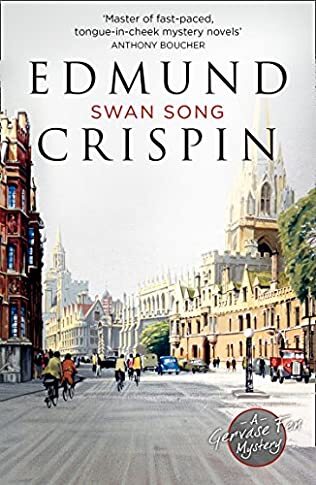Swan Song

A review of Swan Song by Edmund Crispin
Many moons ago I used to share a flat with someone whose antidote to a hangover was to play Wagner at full volume. As we hit the electric sauce rather often back then, the strains of the controversial German composer could often be heard floating across the backwaters of Camberwell. Wagner’s Die Meistersinger von Nürnberg is the backdrop to the very enjoyable that is Edmund Crispin’s fourth outing for his amateur sleuth, Oxford don Gervase Fen. Originally published in 1947 and also going by the alternative title of Dead and Dumb, it was a bold move by Crispin to feature a composer so heavily associated with the Nazis, an attempt to rehabilitate him perhaps or an appropriate backdrop of evil and malice, who knows?
We are familiar with the operatic diva, but Crispin introduces us to an operatic divus, one of the leads, Edward Shorthouse, who is full of himself, obnoxious, and universally hated. He has a number of run-ins with the inexperienced conductor as the opera company prepare to put on Die Meistersinger in Oxford and several of the cast only express a desire for his removal. Even his brother, the eccentric composer, Charles Shorthouse, would love to see him dead, if only so that he can get his hands on his money to finance his ambitious operatic project, The Oresteia.
It is no surprise then that one evening he is found in the Playhouse hanging from a noose. It looks like suicide but on closer inspection there are tie marks on his hands and lower legs and when a post mortem is carried out it seems he has been poisoned as well. The police are happy to accept it as suicide but a rebellious jury at the inquest pass a verdict of murder and Gervase Fen, who already suspects foul play, is determined to work out whodunit and how. Soon afterwards, a junior member of the cast who was only married two days earlier is found on the Playhouse roof having been poisoned and during a performance of the opera, there is an attempt on another’s life.
The plot is such a good take on the usual murder mystery that I will not spoil it. Suffice it to say that there are two murder plots that go disastrously wrong when an innocent inadvertently triggers them off and justice of a sort is kind of done. All I can do if you are intrigued by these gnomic utterances, is to grab a copy of the book and read for yourself.
There is also much more to admire in this book. Crispin writes with great humour and Swan Song is as much a satire of life in operatic companies and academia as it is a murder mystery. He is not averse to a bit of name-dropping, C.S Lewis is spotted on a couple of occasions – it is a Tuesday, after all – and whimsically places Fen amongst detective fiction’s greats when Adam’s wife, Elizabeth, née Harding, plans to interview him for her series on famous sleuths. The descriptions of Fen’s driving style and his noisy, temperamental sports car, Lily Christine, are marvellous. He also has the dialogue of supposedly academic groups down to a tee.
Although amusing, well-written with a flowing pace, Crispin does not give his reader an easy ride. He is not shy in raiding the darkest recesses of the lexicon to test the depths of their vocabulary. The compensations, though, are immense; a clever “impossible” murder which is reconstructed convincingly by Fen, and in part a romantic comedy, with the awkward love affair between Elizabeth and Adam. She is besotted, he does not realise it and it takes the intervention of a third party to make him see sense.
This book has it all.



